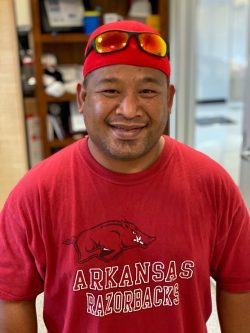
As hunger increased across Arkansas during the pandemic, one population was blocked from participating in a vital safety-net program intended to keep nutritious food on the table during tough times.
Arkansans who were born in the Marshall Islands aren’t eligible for SNAP: the Supplemental Food Assistance Program, formerly known as food stamps.
Even though Marshallese-born residents are lawfully living and working in Arkansas, they don’t qualify for SNAP because of a quarter-century old federal law that overlooked their unique migration status. You may recall that Congress, and then the Arkansas government, made the changes necessary to qualify Marshallese Arkansans for Medicaid earlier this year. That was in response to the pandemic.
But no such change has yet happened for food-assistance programs like SNAP.
That leaves Marshallese parents like Livitikos Bungitak without enough food for his family.
“I’m scared and I’m frustrated,” he told us recently in an interview.
Livitikos has been a single dad of four since his children’s mother died when their youngest child was just an infant. He’s worked in numerous manufacturing jobs over the years but has been unemployed since an injury kept him from working at a cookie-production facility in Springdale.
Even when he was able to work full-time, his income was low enough to qualify for SNAP benefits, but he’s ineligible. His children, on the other hand, are eligible for SNAP because they were born in the United States. But his application for them was denied amid confusion about his own eligibility and the documents required.
Having access to SNAP “would save us from hunger,” he said of him and his family.
Michelle Pedro, the policy advocate and communication specialist for Arkansas Coalition for the Marshallese, said that’s fairly typical of the issues faced by families they serve.
“Families come in every day” seeking help with SNAP benefits. Most don’t qualify, she said.
Her organization and others, including Arkansas Advocates for Children and Families, hope to see a change in federal law that would allow Arkansans born in the Marshall Islands to qualify for SNAP. Congressman Steve Womack of Rogers is the cosponsor of a bipartisan bill that aims to fix that issue, among others that Marshallese-born residents face in the United States.
If that doesn’t get traction, changes to SNAP policy could help, as well. Congress will be working on the Farm Bill, which includes SNAP, over the next couple of years. If re-elected, Arkansas’s Senator John Boozman will play a key role in putting together that legislation in his leadership role on the Senate Agriculture Committee.
This is one example of many policy barriers that make it harder for families to transition from poverty to financial stability, and one of the many reasons that non-white children in Arkansas face a higher rate of food insecurity in our state. During the pandemic, federal policy changes helped millions of families get the nutrition their families needed to keep their children healthy. But that left out far too many Marshallese families.
With bipartisan agreement to fix this unfair policy, it’s time we do just that.
